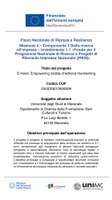E-Hand. Empowering middle childhood Handwriting
Programma di finanziamento: PRIN 2022
Ente finanziatore: MUR
Responsabile scientifica: Noemi Del Bianco
Ruolo UniMC: capofila
Durata: 24 mesi
Descrizione del progetto:
Writing is a central practice in the personal development of individuals and therefore it is crucial to investigate its evolution and relative effects, from multiple perspectives, in the digital era. The increased use of digital technologies for education and work is rapidly changing the writing paradigm, favoring digital writing on real or virtual keyboards. Recent data show a constant increase in cases of dysgraphia. From the data reported by MIUR [1] the growth in the last 7 years has been 2.5%. Success in the handwriting task requires the acquisition and development of muscle structures and coordination for fine and gross motor skills [2], the acquisition of visual-motor integration patterns and the requirements for graphomotor fluency [3, 4]; moreover, competent handwriting depends on postural control during handwriting tasks. How the acquisition of handwriting skills is evolving in digital natives children between 5 and 7 years old, and what could be the elements involved in the increase of dysgraphia cases are among the main research questions. In this direction we want to explore future observation protocols capable of detecting predictive development indicators or indicators of risk in the acquiring process of writing from the age of 5.
For these purposes, the project makes use of technologies for the monitoring and training of handwriting performance, to support the correct development of pupils’ handwriting skills and the early detection and correction of dysgraphia. Numerous tools enable handwriting on digital media, e.g. touchscreens, graphic tablets and pens, but none really ensure the replication of the handwriting experience. Haptic displays, stimulating kinesthetic components and tactile feedback, are promising because they require visual-motor skills and graphomotor fluency [2]. Investigating the impact of digitalisation on handwriting skills development becomes relevant to know and explore at the level of graphomotor micro-movements what is the global management of writing and of the related emotional dimension and the impacts of that in the developmental age. Starting from these considerations, the proposed research aims at exploring innovative tools equipped with proper sensing technologies to monitor the writing process, studying the evolution of writing in children aged 5-7 years and the interaction among motivational and emotional aspects by multimodal learning analytics and data mining (collection and analysis of knowledge traces, risk indicators in the evolution of writing, emotional states, movements and postures, etc.). To this end, the project aims to develop and test new teaching aids to improve writing, intervene at an early stage for possible dysgraphia issues and finally support learners with disadvantaged backgrounds and contexts.







